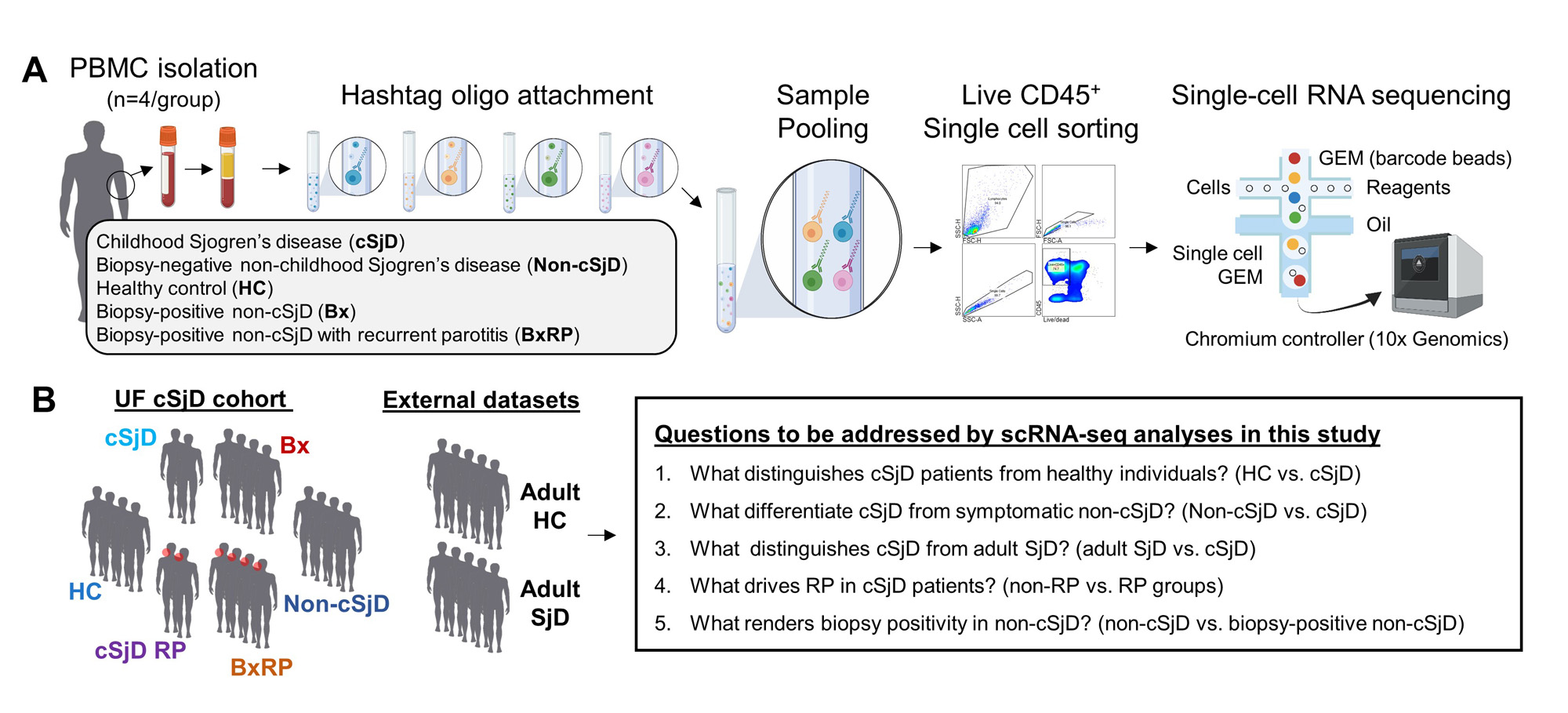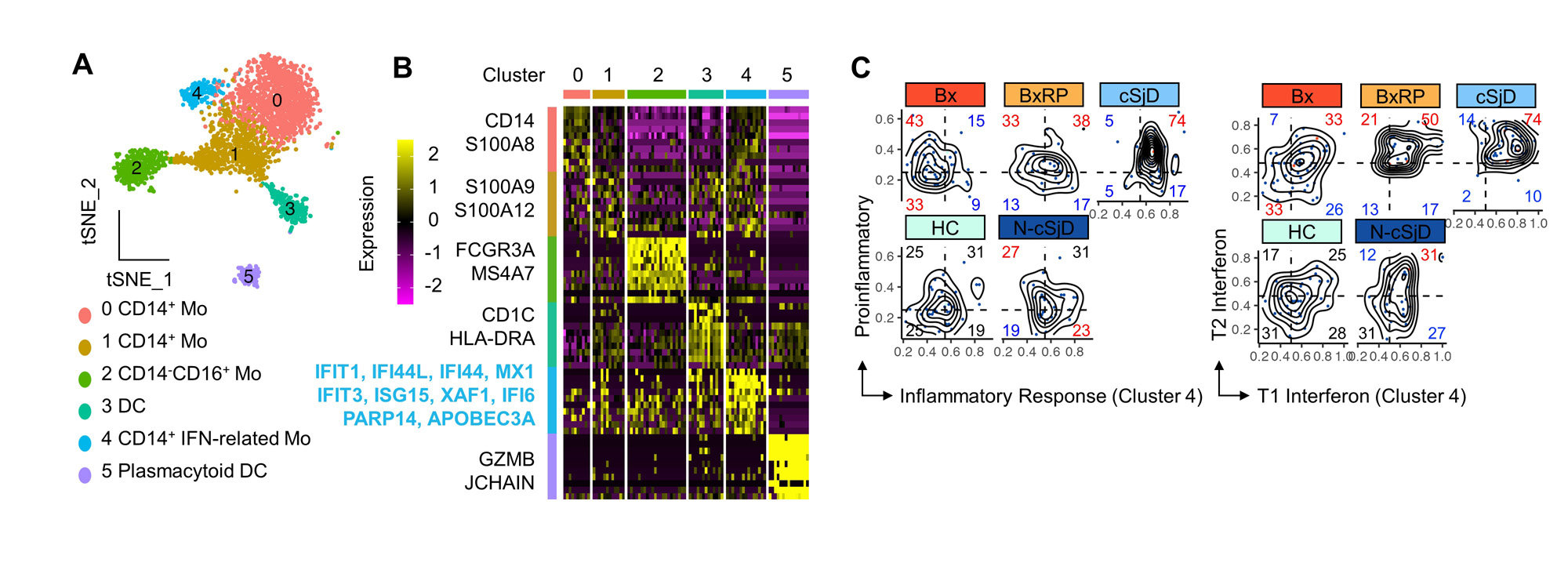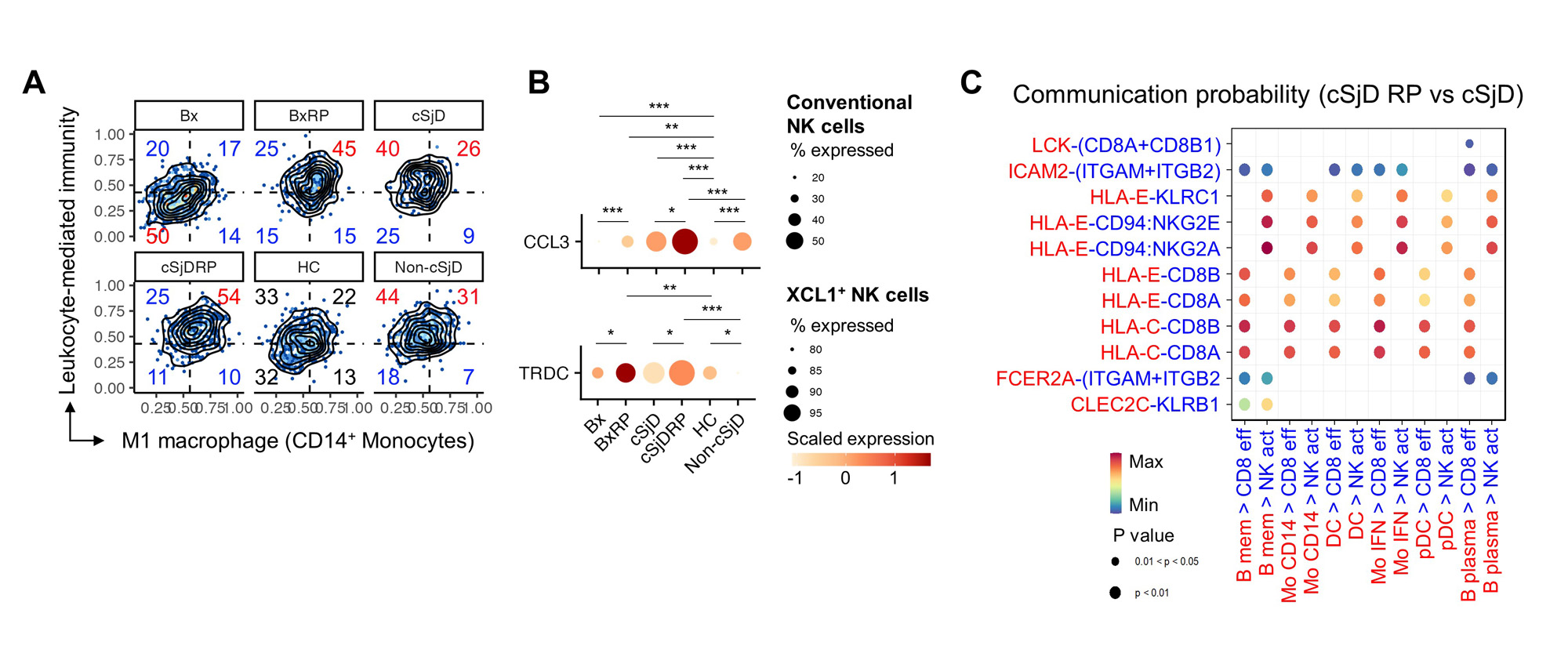Session Information
Date: Monday, November 13, 2023
Title: (1365–1382) Sjögren’s Syndrome – Basic & Clinical Science Poster I
Session Type: Poster Session B
Session Time: 9:00AM-11:00AM
Background/Purpose: This study was performed to characterize key immune cell subsets and their interactions in patients with childhood Sjögren’s disease (cSjD) for the first time in the field. Unlike Sjögren’s disease (SjD), diagnostic criteria, treatment protocols, and natural history are unavailable in cSjD. In the current study, we aimed to address the following questions: 1) What distinguishes cSjD patients from healthy individuals?, 2) What distinguishes cSjD from symptomatic non-cSjD?, 3) Is cSjD a distinct disease entity from adult SjD?, 4) What involves biopsy positivity in non-cSjD?, and 5) Most importantly, what are the transcriptome and interactome profiles contributing to recurrent parotitis (RP), a chief complaint that prompts the most clinical visits from young children with cSjD?
Methods: Five groups of four PBMC samples from the University of Florida (UF) pediatric cohort were profiled by single-cell RNA-seq (scRNA-seq). The groups include: cSjD, non-cSjD, biopsy-positive non-cSjD (Bx), biopsy-positive non-cSjD with RP (BxRP), and healthy controls (HC) (Figure 1). cSjD patients were diagnosed based on the 2016 ACR/EULAR criteria for primary SjD. The CellChat R package identified cell-to-cell interaction strength and frequency. Flow cytometry for immune subsets and regulatory T cell (Treg) functional assays for Treg suppression were also performed.
Results: Prominent effector memory CD4+ T cells (Tem) noted in cSjD were characterized by genes involving inflammation and cytolysis. A unique cluster of proinflammatory CD14+ monocytes enriched with type I and type II IFN-related genes was highly specific to cSjD compared with the published scRNA-seq dataset from adult SjD (Figure 2). Surprisingly, in vitro Treg function in cSjD was intact and distinct from reduced Treg functionality in SjD. The X-C-motif-chemokine-ligand-1 (XCL1)+ NK subset was expanded significantly, exhibiting functional enhancement in NK-mediated cytotoxicity and transmigration. Subjects with RP had more M1-like CD14+ monocytes, Tem, and XCL1+ NK cells. Importantly, effector CD8+ T and XCL1+ NK cells were analyzed to be activated by dendritic cells or memory B cells, based on our interactome analyses (Figure 3). Significant upregulation of CCL3 was noted in NK cells from patients in the RP group, compared to those not in the RP group.
Conclusion: Our study, based on scRNA-seq analysis of PBMC from our UF cohort, revealed that: 1) Enhanced immune cell interactions and inflammatory monocyte clusters enriched with IFN-related genes are the key features in cSjD. 2) M2-polarized monocytes distinguish non-cSjD from cSjD. 3) Tregs in cSjD are functionally competent, whereas the regulatory function of Tregs in adult SjD are suppressed. 4) Biopsy-positive non-cSjD contains proinflammatory M1-polarized monocytes. 5) Patients with RP present inflammatory immune subsets and enhanced interactions similar to cSjD. A subset of more activated NK cell subset might also contribute to RP through preferential recruitment of effector types of T cells, including MAIT-like CD8+ T cells, by CCL3-producing NK cells.
(B) Among the top 20 DEGs defining each subset, representative genes are presented on the heatmap with Cluster 4 characteristically distinguished from others by the distinct upregulation of IFN-related genes. (C) Hex density enrichment plot reveals enrichment pattern of proinflammatory and inflammatory responses and type I and II IFN signatures in Cluster 4 of each group. Red and blue numbers on each quadrant illustrate upward and downward trends, respectively, compared to HC.
To cite this abstract in AMA style:
Kim M, De U, Borcherding N, Paek J, Winn N, Bhattacharyya I, Yu Q, Kolb R, Drashansky T, Thatayatikom A, Zhang W, Cha S. A Unique Cluster of Inflammatory Monocytes and Functionally Intact Regulatory T Cells in Rare Childhood Sjögren’s Disease [abstract]. Arthritis Rheumatol. 2023; 75 (suppl 9). https://acrabstracts.org/abstract/a-unique-cluster-of-inflammatory-monocytes-and-functionally-intact-regulatory-t-cells-in-rare-childhood-sjogrens-disease/. Accessed .« Back to ACR Convergence 2023
ACR Meeting Abstracts - https://acrabstracts.org/abstract/a-unique-cluster-of-inflammatory-monocytes-and-functionally-intact-regulatory-t-cells-in-rare-childhood-sjogrens-disease/



